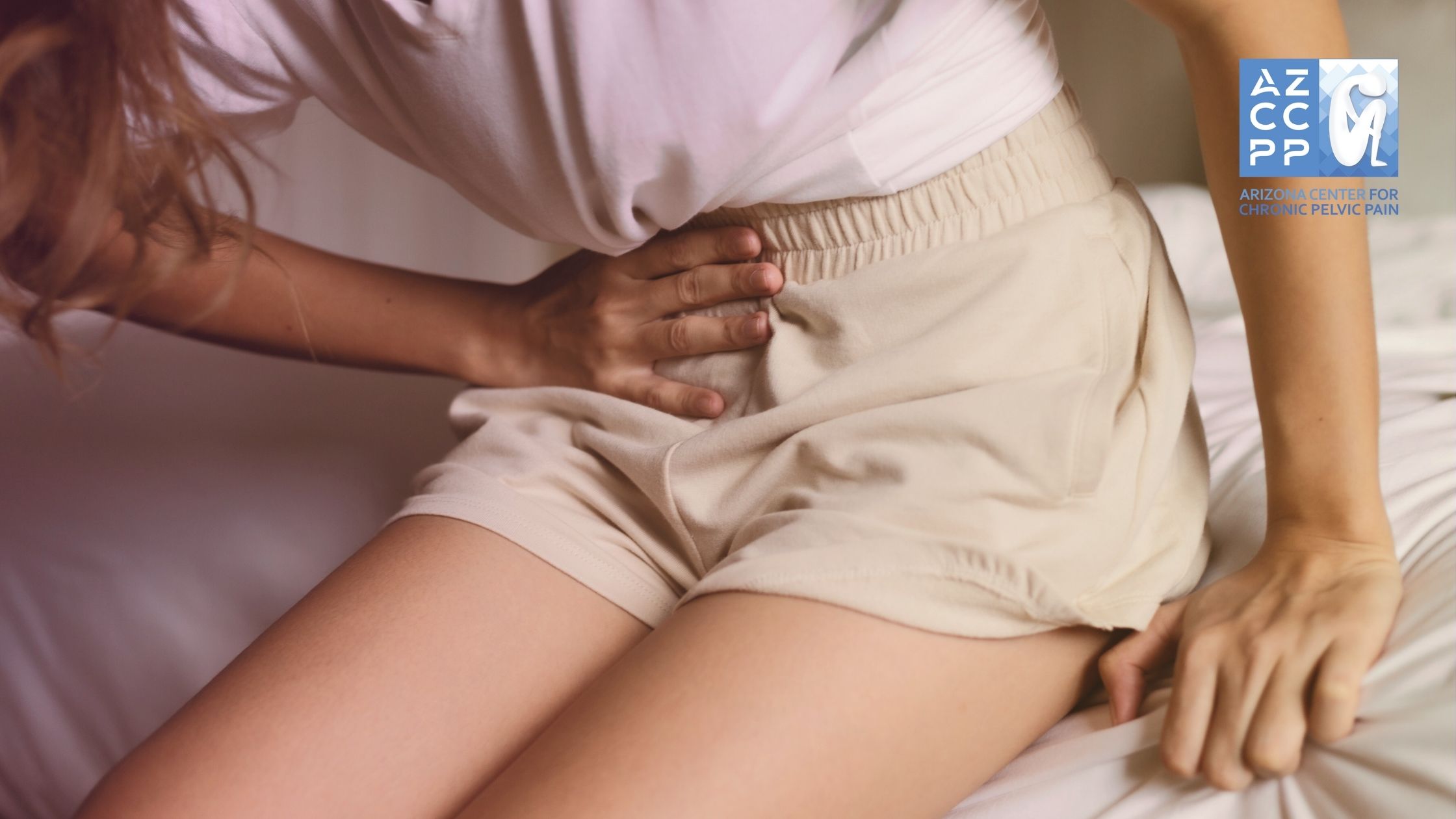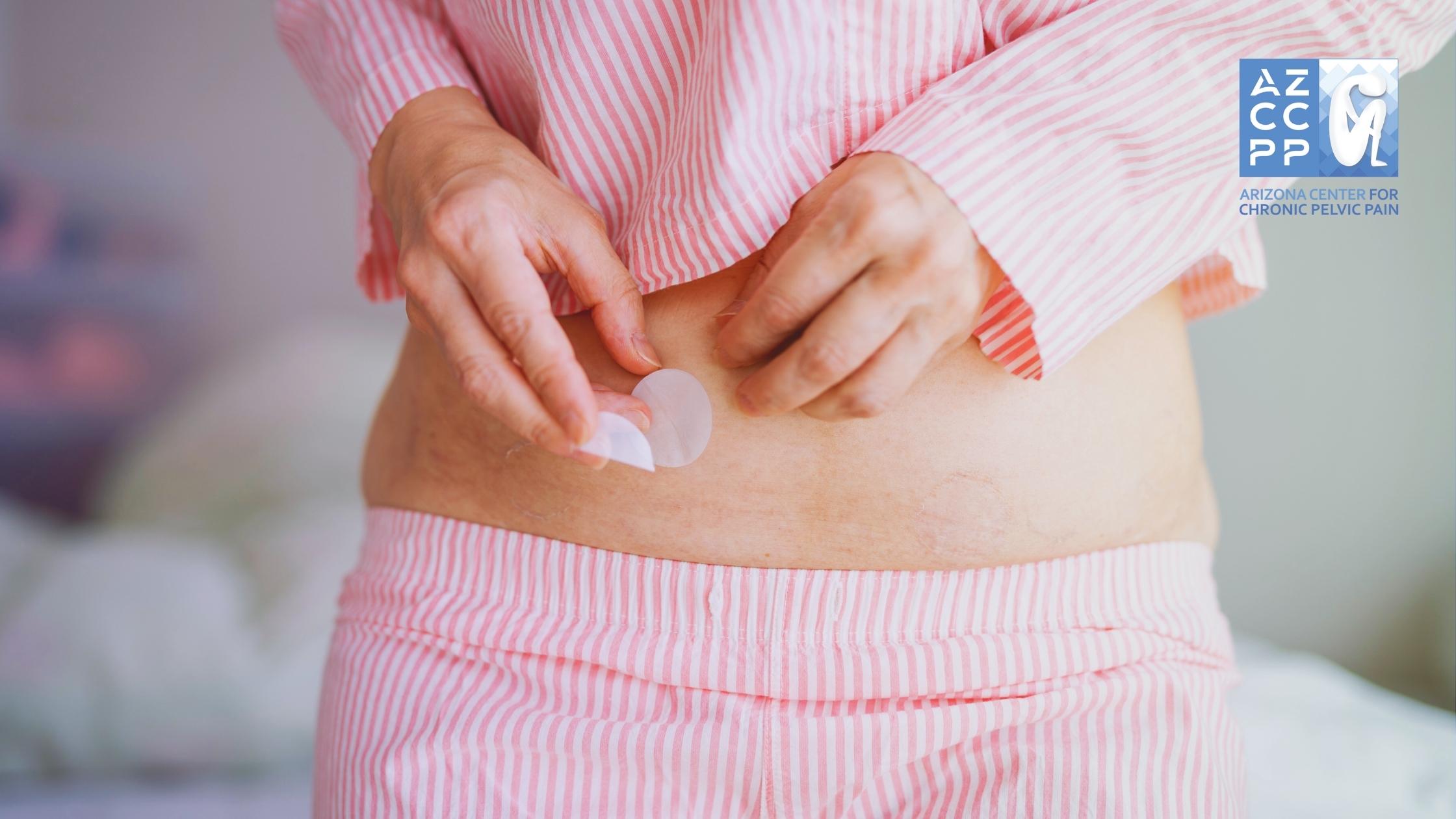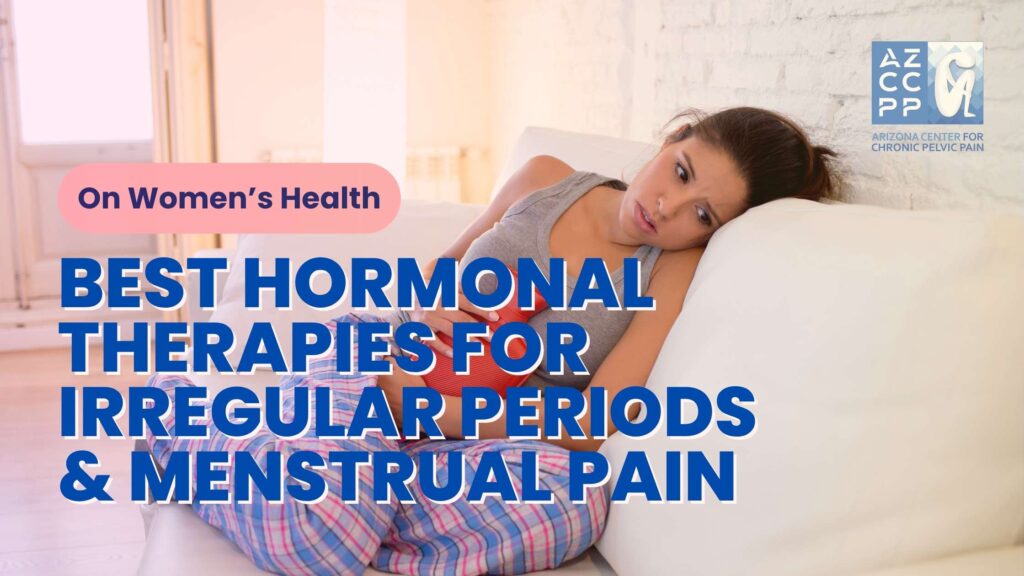At the Arizona Center for Chronic Pelvic Pain (AZCCPP), we recognize how irregular periods and menstrual pain can disrupt daily life, impacting everything from work to personal relationships. These symptoms often stem from hormonal imbalances or underlying conditions like endometriosis or ovarian cysts, contributing to chronic pelvic pain in women.
Led by Dr. Michael Hibner, our expert pelvic pain doctor team specializes in hormonal therapies and pelvic pain treatment to restore balance and provide lasting relief.
This comprehensive guide explores the best hormonal therapies for managing irregular periods and menstrual pain, offering women in Arizona personalized solutions to reclaim their health.
Understanding Irregular Periods and Menstrual Pain

Irregular periods refer to menstrual cycles that vary significantly in length, flow, or frequency, often deviating from the typical 21–35-day cycle. Menstrual pain, or dysmenorrhea, ranges from mild cramps to debilitating pelvic pain that interferes with daily activities.
These symptoms may signal hormonal imbalances, polycystic ovary syndrome (PCOS), endometriosis, or uterine fibroids. At AZCCPP, we prioritize identifying the root cause to deliver effective pelvic pain treatment.
Says Michael Hibner, MD, PhD, Pelvic Surgeon and founder of AZCCPP,
“Hormonal imbalances can wreak havoc on a woman’s quality of life, but targeted hormonal therapies can make a transformative difference.”
Our team uses advanced diagnostics to pinpoint the causes of irregular periods and menstrual pain, ensuring tailored treatment plans that address both symptoms and underlying conditions.
Causes of Irregular Periods and Menstrual Pain
Several factors can contribute to irregular periods and menstrual pain, including
- Hormonal Imbalances: Fluctuations in estrogen and progesterone, often seen in PCOS or perimenopause, can disrupt ovulation and cause irregular cycles.
- Endometriosis: This condition, where uterine-like tissue grows outside the uterus, often leads to painful periods and chronic pelvic pain in women.
- Ovarian Cysts: Functional or pathological cysts can interfere with ovulation, causing irregular bleeding and pelvic pain.
- Uterine Fibroids: These benign growths can lead to heavy, painful periods.
- Stress and Lifestyle Factors: Chronic stress, poor diet, or excessive exercise can disrupt hormonal balance, exacerbating menstrual pain.
Our Pelvic Pain Doctor team at AZCCPP conducts thorough evaluations to identify these causes, combining medical history, physical exams, and diagnostic tests to guide hormonal therapies.
Diagnosing the Root Cause of Irregular Periods & Menstrual Pain

Accurate diagnosis is essential for effective pelvic pain treatment. At the Arizona Center for Chronic Pelvic Pain, we employ a range of advanced tools to uncover the causes of irregular periods and menstrual pain:
-
Comprehensive Medical History
We begin with a detailed review of your menstrual history, symptoms, and lifestyle factors to identify patterns or triggers.
-
Hormonal Blood Tests
Blood tests measure levels of estrogen, progesterone, thyroid hormones, and other markers to detect imbalances contributing to irregular periods.
-
Ultrasound Imaging
Transvaginal or abdominal ultrasound helps identify structural issues like ovarian cysts, fibroids, or endometrial abnormalities.
-
Laparoscopy
For suspected endometriosis, a minimally invasive laparoscopy allows our Pelvic Pain Doctor to visualize and biopsy abnormal tissue, confirming the diagnosis and guiding hormonal therapies.
Our multidisciplinary approach ensures precise diagnoses, enabling us to craft personalized pelvic pain treatment plans that address both symptoms and their causes.
Top Hormonal Therapies for Irregular Periods and Menstrual Pain
Hormonal therapies are a cornerstone of treatment for irregular periods and menstrual pain, offering targeted solutions to regulate cycles and reduce chronic pelvic pain in women. At AZCCPP, we offer the following evidence-based options:
-
Combined Oral Contraceptives (COCs)
Combined oral contraceptives, containing estrogen and progestin, regulate menstrual cycles by suppressing ovulation and stabilizing hormone levels. They reduce menstrual pain by thinning the uterine lining, decreasing prostaglandin production, which triggers cramps. COCs are highly effective for women with PCOS or functional ovarian cysts, with studies showing up to 80% reduction in dysmenorrhea symptoms.
-
Progestin-Only Therapies
For women who cannot tolerate estrogen, progestin-only pills or intrauterine devices (IUDs) like Mirena provide relief from irregular periods and menstrual pain. Progestins suppress endometrial growth, reducing heavy bleeding and pelvic pain associated with endometriosis. The Mirena IUD, for example, can reduce menstrual flow by up to 90% within six months.
-
Gonadotropin-Releasing Hormone (GnRH) Agonists
GnRH agonists, such as leuprolide, temporarily induce a menopause-like state by suppressing ovarian hormone production. This therapy is highly effective for severe menstrual pain caused by endometriosis, reducing pelvic pain by up to 70% in clinical trials. Due to side effects like hot flashes, it’s typically used for short-term management under close supervision by a Pelvic Pain Doctor.
-
Aromatase Inhibitors
For women with endometriosis-related menstrual pain, aromatase inhibitors like letrozole reduce estrogen production, shrinking endometrial implants and alleviating chronic pelvic pain in women. These are often combined with other hormonal therapies for optimal results.
-
Hormonal Patches and Vaginal Rings

Hormonal patches and vaginal rings deliver steady doses of estrogen and progestin, offering an alternative to pills for women seeking convenience. These options stabilize cycles and reduce menstrual pain, with the added benefit of fewer daily doses.
“Hormonal therapies are not one-size-fits-all. At AZCCPP, we customize treatments to each patient’s needs, ensuring both symptom relief and long-term health,” says Michael Hibner, MD, PhD. Our team monitors treatment progress with regular follow-ups to adjust therapies as needed.
Complementary Approaches to Enhance Hormonal Therapies
While hormonal therapies are highly effective, combining them with complementary strategies can amplify relief from irregular periods and menstrual pain:
-
Pain Management
Nonsteroidal anti-inflammatory drugs (NSAIDs) like ibuprofen reduce prostaglandin-driven cramps, providing immediate relief from menstrual pain. Our Pelvic Pain Doctor team may recommend specific NSAIDs based on your symptoms.
-
Lifestyle Modifications
A balanced diet rich in omega-3 fatty acids, magnesium, and vitamin D can support hormonal balance and reduce inflammation. Regular exercise, such as yoga or swimming, improves blood flow and alleviates pelvic pain.
-
Pelvic Floor Physical Therapy

For women with chronic pelvic pain in women, pelvic floor physical therapy strengthens muscles and reduces tension, complementing hormonal therapies. AZCCPP offers access to specialized therapists to enhance treatment outcomes.
-
Stress Management
Chronic stress can exacerbate hormonal imbalances. Techniques like mindfulness, meditation, or counseling help manage stress, supporting the effectiveness of pelvic pain treatment.
When Surgery May Be Necessary
In cases where hormonal therapies alone cannot manage irregular periods or menstrual pain, surgical intervention may be required. Conditions like severe endometriosis or large ovarian cysts may necessitate laparoscopic surgery to remove abnormal tissue or cysts while preserving fertility. At AZCCPP, our Pelvic Pain Doctor, Michael Hibner, MD, PhD, specializes in minimally invasive techniques that minimize scarring and promote faster recovery.
Preventing Irregular Periods and Menstrual Pain
While not all causes of irregular periods and menstrual pain can be prevented, proactive steps can reduce their severity:
- Regular Checkups: Routine pelvic exams at AZCCPP detect early signs of hormonal imbalances or structural issues, enabling timely pelvic pain treatment.
- Hormonal Maintenance: Consistent use of prescribed hormonal therapies prevents cycle irregularities and reduces menstrual pain.
- Healthy Lifestyle: Maintaining a healthy weight, avoiding excessive alcohol, and quitting smoking support hormonal health and reduce chronic pelvic pain in women.
Our team partners with patients to create long-term strategies that minimize symptom recurrence and promote wellness.
Living with Irregular Periods and Menstrual Pain
Dealing with irregular periods and menstrual pain can feel isolating, but you don’t have to navigate it alone. At the Arizona Center for Chronic Pelvic Pain, we provide holistic care that addresses the physical, emotional, and psychological impacts of chronic pelvic pain in women. Support groups, counseling, and personalized pelvic pain treatment plans empower women to live confidently despite their symptoms.
For related insights, explore our article on Understanding Ovarian Cysts and Pelvic Pain Treatment at Arizona Center for Chronic Pelvic Pain.
Conclusion: Transform Your Life with Effective Hormonal Therapies
Irregular periods and menstrual pain don’t have to define your life. With the right hormonal therapies and expert pelvic pain treatment, you can achieve lasting relief and regain control of your health.
At the AZCCPP, our pelvic pain doctor team, led by Dr. Michael Hibner, offers personalized solutions to address chronic pelvic pain in women. Take the first step toward a pain-free future today.

Partner with AZCCPP for Expert Pelvic Pain Treatment
Struggling with irregular periods or debilitating menstrual pain? The Arizona Center for Chronic Pelvic Pain, led by Michael Hibner, MD, PhD, provides specialized care to address your unique symptoms. From advanced hormonal therapies to minimally invasive surgery, our Pelvic Pain Doctor team creates customized pelvic pain treatment plans to restore your health and quality of life. We understand the challenges of chronic pelvic pain in women and are committed to guiding you every step of the way.
With decades of expertise in pelvic pain treatment, AZCCPP is Arizona’s premier destination for women’s pelvic health. Our compassionate, multidisciplinary approach ensures holistic care that addresses both physical and emotional needs. We’re dedicated to helping you achieve lasting relief and confidence in your health journey.
Ready to take control? Contact the Arizona Center for Chronic Pelvic Pain today at (480) 599-9682 or email [email protected]. You may also check out AZCCPP on YouTube for more questions that need answers with Dr. Michael Hibner.
We proudly serve the Phoenix metro area, including Scottsdale, Chandler, and Mesa. Follow us on social media for inspiring patient stories and expert insights. Let our pelvic pain experts help you overcome chronic pelvic pain—schedule your consultation now!
References
- Farghaly, S. A. (2023). Hormonal management of dysmenorrhea and irregular menstruation: Arizona-based perspectives. Women’s Health Reports, 4(8), 512–519. https://doi.org/10.1089/whr.2023.0045
- Smith, J. R., & Hibner, M. (2024). Efficacy of hormonal therapies for endometriosis-related pelvic pain: A study from Arizona. American Journal of Obstetrics and Gynecology, 230(3), 287–294. https://doi.org/10.1016/j.ajog.2024.01.012
- Patel, M. D. (2022). Ultrasound-guided diagnosis of menstrual disorders in Arizona cohorts. Journal of Women’s Health, 31(6), 678–685. https://doi.org/10.1089/jwh.2022.0321

